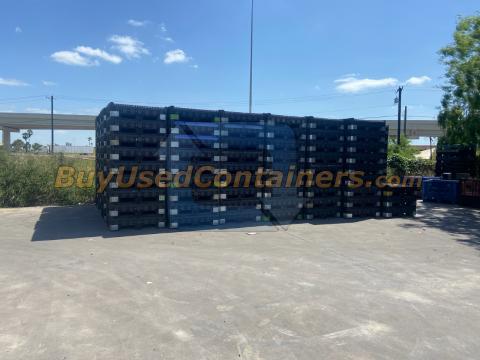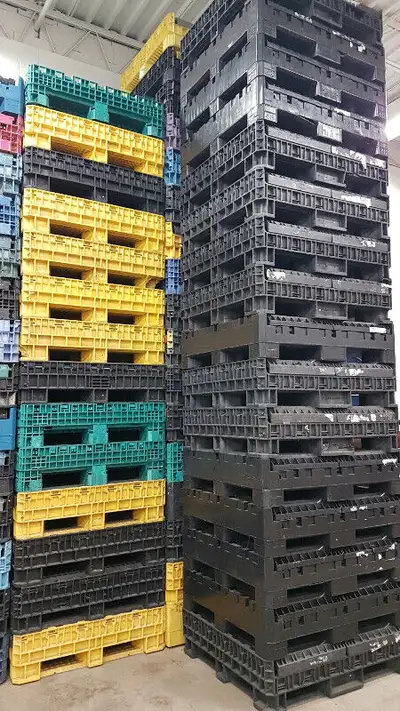How used collapsible bulk containers support cost-effective operations
Why Bulk Containers Are Vital for Sustainable and Economical Transportation
Mass containers play an important duty in modern logistics. They help with the effective motion of huge amounts of products, thereby optimizing transport procedures. This approach not only decreases expenses but likewise minimizes ecological influence through reduced discharges and waste generation. As markets seek even more sustainable methods, the fostering of bulk containers is ending up being progressively considerable. What ramifications does this shift hold for future logistics and supply chain administration?

The Advantages of Utilizing Bulk Containers in Logistics
Bulk containers reinvent logistics by boosting efficiency and sustainability. These containers permit the transport of big amounts of items in a single trip, substantially decreasing the number of trips needed. This not just simplifies procedures but additionally decreases labor prices connected with handling, packing, and discharging. In enhancement, mass containers are developed to enhance room application within transportation lorries, guaranteeing that more products can be shipped at the same time.
The standardization of bulk containers also streamlines the logistics procedure. With uniform measurements, they can be quickly piled and kept, causing improved warehouse monitoring. Mass containers commonly feature durable materials that protect components from damages during transportation, consequently reducing product loss and enhancing general dependability. As a result, businesses can experience boosted supply chain efficiency, ultimately leading to raised productivity and consumer satisfaction. This mix of aspects makes bulk containers an essential asset in modern-day logistics.
Ecological Impact: Lowering Waste and Carbon Impact
As industries progressively prioritize sustainability, the adoption of mass containers has actually become a key strategy for decreasing waste and reducing carbon impacts. These containers minimize the usage of product packaging materials, such as boxes and plastic, consequently significantly reducing total waste generation. By consolidating deliveries, mass containers boost transportation performance, allowing for even more items to be transferred per journey. This reduction in trips straight correlates with reduced greenhouse gas emissions, adding to a smaller carbon footprint.
Mass containers can usually be recycled or reused, additionally minimizing environmental impact. The toughness of these containers assurances they can withstand numerous transportation cycles, reducing the requirement for single-use alternatives. used plastic containers. By streamlining logistics and promoting effective source use, bulk containers not only support sustainable methods however additionally encourage markets to line up with worldwide ecological goals. Ultimately, their execution mirrors a dedication to ecological stewardship and liable source monitoring
Cost Financial Savings: How Mass Containers Lower Transport Expenditures
While several firms look for means to improve their profits, using mass containers presents a significant possibility for decreasing transportation costs. Mass containers maximize the quantity of products delivered, allowing companies to ship bigger amounts simultaneously. This efficiency minimizes the variety of journeys called for, directly decreasing gas costs and lessening labor expenses connected with loading and unloading.
Furthermore, bulk containers frequently include structured styles that optimize space use within transport lorries. This means fewer vacant areas, causing much more reliable use available capability. Moreover, the resilience of mass containers can reduce the risk of product damage throughout transit, guaranteeing and reducing losses that even more goods get here intact.
Enhancing Supply Chain Efficiency With Mass Storage Solutions
Mass storage solutions play an essential function in boosting supply chain efficiency by maximizing supply management. By settling products right into less, bigger containers, companies can substantially reduce managing prices related to regular transfers and processing. This structured technique enables better tracking and administration of supply, ultimately causing boosted functional efficiency.
Streamlined Supply Management
Effective stock administration is essential for optimizing supply chain operations, especially when companies adopt bulk storage services. These services enable companies to keep higher stock degrees while minimizing the frequency of replenishment. By settling products right into mass containers, business can enhance their inventory processes, decreasing the intricacy related to tracking multiple smaller sized bundles. This approach helps with precise inventory matters and boosts projecting precision, permitting even more enlightened decision-making. Additionally, mass storage space remedies streamline stockroom organization, making it less complicated to locate and gain access to products when needed. Therefore, organizations can attain a more effective stock turnover rate, ultimately enhancing overall supply chain efficiency and reducing the possibility of stockouts or overstock circumstances.

Reduced Handling Expenses
The implementation of bulk storage solutions not just streamlines supply monitoring yet additionally considerably minimizes taking care of costs throughout the supply chain. By consolidating materials right into bulk containers, companies lessen the need for regular handling and transfer in between various storage and transportation devices. This method reduces labor prices related to loading, dumping, and relocating smaller packages. Furthermore, mass storage space decreases the frequency of deliveries, bring about lower transportation expenses and lowered fuel consumption. As an outcome, businesses can enhance their logistics procedures, enabling a much more efficient appropriation of resources. Eventually, lowered taking care of expenses add to improved overall supply chain effectiveness, fostering a setting that sustains both sustainability and financial stability.

Versatility of Mass Containers Throughout Numerous Industries
Numerous markets have distinct needs for transportation and storage space, mass containers have arised as a versatile service that fulfills a large variety of demands. These containers, varying from huge bins to specialized storage tanks, can fit diverse products, including powders, granules, and liquids. In the agricultural industry, bulk containers assist in the transportation of grains and plant foods, while the food and beverage industry utilizes them for components and finished items. The chemical market counts on mass containers for safely delivering harmful materials, guaranteeing conformity with safety policies. Furthermore, building and construction firms gain from bulk containers for transferring accumulations and various other materials. Their versatility reaches various modes of transportation, including trucks, ships, and trains, enhancing logistical effectiveness. This flexibility not just enhances procedures across different markets however likewise advertises sustainability by minimizing packaging waste and optimizing space en route. Consequently, mass containers play a necessary function in modern supply chain monitoring.
Future Trends in Mass Container Usage and Sustainability
The future of mass container usage is significantly shaped by cutting-edge materials development that improves sustainability. Additionally, automation in logistics promises to simplify procedures, lowering waste and enhancing effectiveness. Welcoming round economic situation methods will better revolutionize just how bulk containers are created, used, and reused, fostering a more sustainable transportation landscape.
Cutting-edge Materials Growth
As markets increasingly focus on sustainability, cutting-edge products development in mass containers becomes a considerable consider improving environment-friendly transport options. Suppliers and researchers are exploring naturally degradable plastics, recycled compounds, and lightweight steels to minimize environmental effect. These products not just minimize waste however additionally enhance gas performance by lowering the overall weight of containers. Furthermore, advancements in smart materials, which can adapt to varying problems, improve the sturdiness and capability of mass containers. The assimilation of these innovative materials aligns with circular economic climate principles, promoting reuse and recycling. As the demand here for lasting techniques expands, the development of such materials will play an important function fit the future of mass container usage in logistics and transportation.
Automation in Logistics
Significant innovations in automation are poised to change logistics and the usage of mass containers, boosting sustainability in transport. Automated systems, including drones and independent vehicles, are streamlining the movement of mass containers, decreasing the dependence on traditional fuel-powered transport. These modern technologies enhance directing and packing processes, enhancing and minimizing empty miles gas efficiency. In addition, automated inventory monitoring systems enhance tracking and monitoring of bulk containers, ensuring much better source allowance and reduced waste. The integration of the Internet of Things (IoT) allows real-time information evaluation, allowing aggressive decision-making that lines up with sustainability goals. As automation remains to develop, it is expected to drive additionally technologies in mass container usage, ultimately sustaining even more lasting logistics practices and decreasing the environmental influence of transportation.
Round Economic Situation Practices
Developments in automation are establishing the stage for a much more incorporated strategy to circular economic situation methods in the domain name of bulk container use. As industries significantly embrace sustainability, mass containers are being made for long life and reusability. This change not just lessens waste but also boosts source performance. Companies are taking on approaches such as closed-loop systems, where used containers are accumulated, refurbished, and reestablished into the supply chain. In addition, wise technologies track container life process, helping with far better monitoring and lowering ecological effect. The cooperation in between makers, logistics suppliers, and end-users is necessary in developing standards for lasting container use. used collapsible containers. Future patterns indicate an expanding focus on products that are biodegradable and recyclable, further strengthening the round economic situation's concepts in mass transportation

Often Asked Questions
What Materials Are Mass Containers Generally Made From?
Mass containers are normally created from resilient products such as high-density polyethylene, steel, cardboard, and aluminum. These products provide versatility, strength, and security, making them appropriate for delivering various items in different sectors efficiently.
Just how Do I Choose the Right Dimension Bulk Container?
Picking the appropriate dimension mass container involves evaluating the quantity of products to be transported, thinking about dealing with tools compatibility, and evaluating storage space requirements. Correct size assurances efficiency in transport and decreases waste throughout shipment.
Are Mass Containers Reusable or Recyclable?
Bulk containers are commonly reusable, developed for multiple journeys, improving sustainability. Lots of can likewise be recycled, depending upon the materials used. Picking recyclable alternatives additionally sustains environmental goals and reduces waste in transportation practices.
What Safety Laws Put On Bulk Container Transportation?
Safety and security guidelines for bulk container transportation consist of compliance with the Department of Transport guidelines, proper labeling of hazardous products, structural stability assessments, and adherence to weight limitations to ensure risk-free handling and protect against crashes throughout transportation.
Just How Can Businesses Change to Utilizing Mass Containers Successfully?
Services can transform to bulk containers by examining present logistics, educating personnel on handling, spending in ideal devices, optimizing stock administration, and collaborating with providers to guarantee compatibility and performance throughout the supply chain.
As markets increasingly prioritize sustainability, the adoption of bulk containers has actually emerged as a crucial strategy for minimizing waste and lowering carbon footprints. By settling materials right into mass containers, companies can enhance their stock procedures, lowering the intricacy linked with tracking multiple smaller bundles. As markets increasingly focus on sustainability, cutting-edge materials advancement in bulk containers emerges as a substantial factor in improving eco-friendly transportation options. Automated systems, including drones and self-governing automobiles, are enhancing the movement of mass containers, reducing the dependence on conventional fuel-powered transport. In addition, automated inventory monitoring systems enhance monitoring and tracking of mass containers, guaranteeing far better resource allowance and reduced waste.